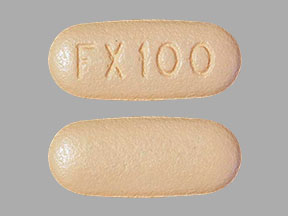Viberzi and Alcohol/Food Interactions
There is 1 alcohol/food/lifestyle interaction with Viberzi (eluxadoline).
eluxadoline food
Major Food Interaction
CONTRAINDICATED: Consumption of more than 3 alcoholic beverages per day may increase the risk of acute pancreatitis during treatment with eluxadoline. Pancreatitis has been reported rarely during clinical trials of eluxadoline, and may or may not be related to sphincter of Oddi spasm.
ADJUST DOSING INTERVAL: High-fat meals may reduce the oral bioavailability of eluxadoline. In 28 healthy volunteers, administration of a single 100 mg dose of eluxadoline with a high-fat meal (approximately 800 to 1000 total calories, 50% from fat) decreased eluxadoline peak plasma concentration (Cmax) and systemic exposure (AUC) by 50% and 60%, respectively, compared to administration in the fasted state. There was no significant effect on the time to peak concentration (Tmax). The clinical relevance of this interaction is unknown. It should be noted that phase 3 clinical trials were conducted under fed conditions.
MANAGEMENT: Chronic or acute excessive use of alcohol should be avoided during treatment with eluxadoline. Alcoholism, alcohol abuse, alcohol addiction, and consumption of more than 3 alcoholic beverages per day are considered contraindications to the use of eluxadoline. The product labeling recommends taking eluxadoline with food. Patients should be advised to stop taking eluxadoline and seek medical attention if they experience potential symptoms of pancreatitis such as persistent nausea, vomiting, abdominal tenderness, and upper abdominal pain, especially that which is made worse after eating or radiates to the back or shoulders.
References
- "Product Information. Viberzi (eluxadoline)." Actavis Pharma, Inc. (2015):
Viberzi drug interactions
There are 211 drug interactions with Viberzi (eluxadoline).
Viberzi disease interactions
There are 3 disease interactions with Viberzi (eluxadoline) which include:
More about Viberzi (eluxadoline)
- Viberzi consumer information
- Check interactions
- Compare alternatives
- Pricing & coupons
- Reviews (216)
- Drug images
- Side effects
- Dosage information
- During pregnancy
- FDA approval history
- Drug class: peripheral opioid receptor mixed agonists/antagonists
- Breastfeeding
- En español
Related treatment guides
Drug Interaction Classification
| Highly clinically significant. Avoid combinations; the risk of the interaction outweighs the benefit. | |
| Moderately clinically significant. Usually avoid combinations; use it only under special circumstances. | |
| Minimally clinically significant. Minimize risk; assess risk and consider an alternative drug, take steps to circumvent the interaction risk and/or institute a monitoring plan. | |
| No interaction information available. |
Further information
Always consult your healthcare provider to ensure the information displayed on this page applies to your personal circumstances.


